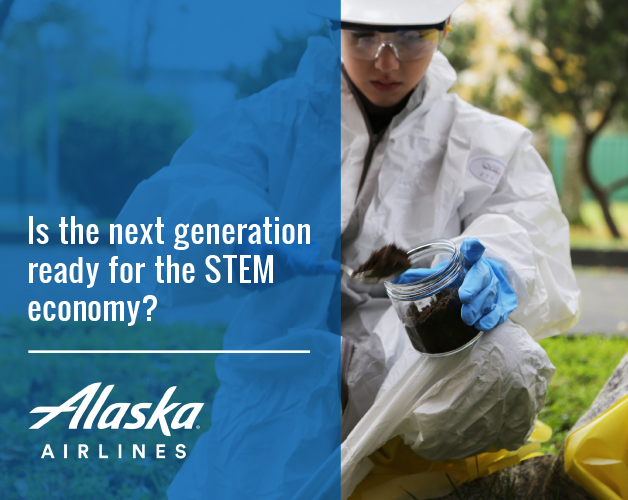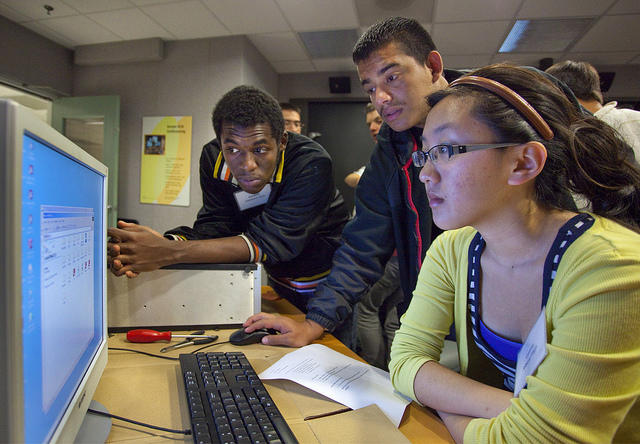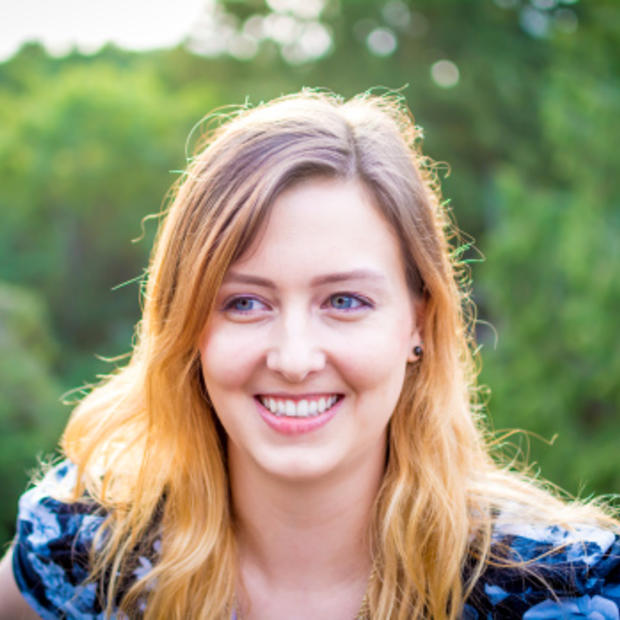High school teacher Renee Poitras doesn’t have her students do pointless busy work. Instead, Poitras, a biology teacher at Kent-Meridian High School, integrates real-world lessons into her classes, which are currently focusing on ecology.
Her students work in teams in order to simulate real-world career problem-solving. And they complete most of their assignments on computers, which helps them learn technology skills that are essential for career success.
All of this is done with specific career goals in mind; later they will be matched with mentors in various fields of science, technology, engineering and math (STEM), and even given opportunities to network with STEM professionals.
“During the process of completing projects or labs, students can contact their professional [mentor] for feedback, and send their final projects off for feedback before they turn them into me,” Poitras said in an email. “This allows my students not only to grow in science, but also to see how they themselves can go into STEM fields.”
It’s all thanks to Educurious, a Seattle-based nonprofit organization that features a “work-based learning” program they call Career Connection.
Due in part to a lack of preparation in school, young people in Washington state often aren’t able to make the connections between their education and their future careers, as educational programs have often not been aligned with the state's workforce demands.
“Middle-skill” jobs in STEM fields, such as dental hygienists, veterinary technicians and radiologic technologists, are expected to account for a “disproportionately high amount of job growth in the future,” according to the Washington State Employment Security Department. But our schools are not preparing kids for those careers.
Educurious works to fix this problem.
“Education and employment are two sides of the same coin in preparing young people for their future,” explains Educurious CEO and Co-Founder Michael Golden. The organization focuses on empowering young people to consider their future careers while they pursue meaningful learning in school.
Teachers working with the Career Connection program emphasize project-based learning, technology and networking with professionals in high-demand areas. As a result, students can start exploring local career opportunities.
Poitras’ class is set up in a way that, instead of studying units, she explains, “students try to answer a guiding problem.” One class’s current guiding problem is to “design a controlled lab or field study that addresses an environmental problem around Kent-Meridian that the city of Kent could implement.”
She explains that this method allows for “the important problem-solving skills that students will need in their future careers.”
Recently, Educurious was one of three Seattle-based programs (along with Seattle Goodwill and Core Plus) selected as a recipient for a state Learning Labs grant. The Learning Labs are part of a statewide observation of work-based, or “career-connected learning,” and were identified through the cooperation of Governor Jay Inslee, the nonprofit Washington STEM and the Workforce Board, a group of governor-appointed representatives of business, labor, and government.
Each Learning Lab received $15,000. In May of 2017, they will convene at the Governor’s Summit on Work-Based Learning to discuss successes and potential improvements in career connected learning across the state.
“We wanted to dig deep into what’s working and what isn’t,” says Eleni Papadakis, executive director at the Workforce Board. “We need to create the right policy framework.”
As a relatively new program, Educurious seemed the perfect fit to qualify as a Learning Labs grant recipient. The program works with populations that often struggle to succeed in the professional world. Kent-Meridian High School, which has been identified in recent years as the most diverse high school in Washington state, provides free and reduced lunches to 75 percent of its students, compared with 52 percent of all students within the Kent school district.
Papadakis says that many kids, especially those in poverty-stricken areas, “don’t know what’s out there,” which can lead to a “sense of despair.” Career connected learning programs help open their eyes to new opportunities. “We see a spark in these kids,” she says. “Career-connected learning is such an important piece of that. They’re the lead actors in their own stories.”
Poitras describes observing some of her students reaching “epiphany” moments in her classes: “I have had students realize that science is all around them, and not just located in a textbook,” she says.
Not only are her students beginning to think about potential career paths, but they’re also more engaged in the learning process, she says. “Students can see why they need to do the homework.”
Some of them are just using a laptop for the first time, Poitras adds. Regardless, “they come up with really good ideas that you and I wouldn’t even have thought of. They’re so creative and innovative if given the chance.”
—
This series made possible with support from Alaska Airlines. The views and opinions expressed in the media, articles, or comments on this article are those of the authors and do not reflect or represent the views and opinions held by Alaska Airlines.


